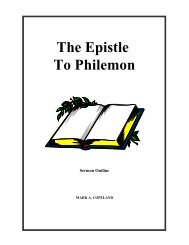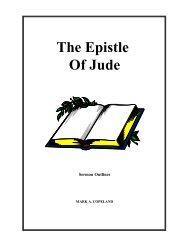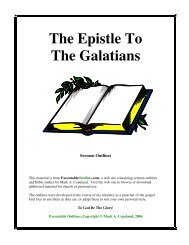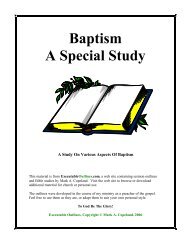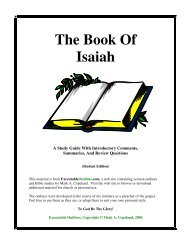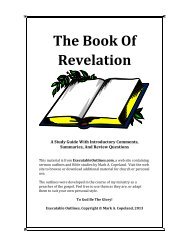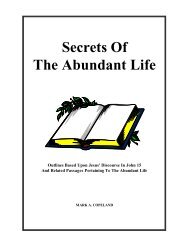The Epistle To The Hebrews - Executable Outlines
The Epistle To The Hebrews - Executable Outlines
The Epistle To The Hebrews - Executable Outlines
Create successful ePaper yourself
Turn your PDF publications into a flip-book with our unique Google optimized e-Paper software.
INTRODUCTION<br />
A Call <strong>To</strong> Be Content<br />
<strong>Hebrews</strong> 13:5-6<br />
1. In this final chapter of <strong>The</strong> <strong>Epistle</strong> <strong>To</strong> <strong>The</strong> <strong>Hebrews</strong>, we have noticed exhortations...<br />
a. <strong>To</strong> let brotherly love continue - He 13:1<br />
b. <strong>To</strong> show love toward strangers - He 13:2<br />
c. <strong>To</strong> remember those in prison and others who are mistreated - He 13:3<br />
d. <strong>To</strong> hold marriage in honor, abstaining from fornication and adultery - He 13:4<br />
2. We now find a warning against covetousness - He 13:5a<br />
a. <strong>The</strong> previous verse was a warning against “the lust of the flesh” (immorality)<br />
b. Here we have a warning against “the lust of the eyes” (materialism)<br />
-- Both of which are contrary to the love of the Father - cf. 1 Jn 2:15-17<br />
3. Covetousness, a strong desire for material things, is strongly condemned in the Bible...<br />
a. Jesus said it defiles a man, and that we should beware of it - Mk 7:21-23; Lk 12:15<br />
b. Paul taught that covetousness...<br />
1) Will keep one out of the kingdom of God - 1 Co 6:9-10<br />
2) Like fornication, should not even be named among us - Ep 5:3<br />
3) Is nothing less than idolatry - Ep 5:5; Co 3:5<br />
4. <strong>The</strong> antidote to covetousness is contentment - He 13:5b-6<br />
a. If we are content, then we won’t be covetous<br />
b. Contentment is therefore an important virtue for Christians to develop...<br />
1) But what is “contentment”?<br />
2) What is the key to being content?<br />
Mark A. Copeland<br />
[In this lesson, “A Call <strong>To</strong> Be Content”, we shall seek to answer these questions, using the text of our<br />
lesson (He 13:5-6) and other scriptures that deal with the subject of contentment...]<br />
I. THE VIRTUE OF CONTENTMENT<br />
A. CONTENTMENT DEFINED...<br />
1. <strong>The</strong> English word “content” means “desiring no more than what one has”<br />
2. <strong>The</strong> Greek word is arkeo {ar-keh’-o}, which means “to be satisfied”<br />
-- When one is content, they are satisfied with what they have; with no desire for more,<br />
covetousness no longer becomes a problem!<br />
B. THE VALUE OF CONTENTMENT...<br />
1. From the pen of uninspired men...<br />
a. “He is richest who is content with the least.” (Socrates)<br />
b. “He is well paid that is well satisfied.” (William Shakespeare)<br />
c. “He who is content can never be ruined.” (Chinese Proverb)<br />
d. “He who wants little always have enough.” (Johann Georg Zimmerman)<br />
e. “If you are not satisfied with a little, you will not be satisfied with much.” (Unknown)<br />
Sermons From <strong>Hebrews</strong> 117





